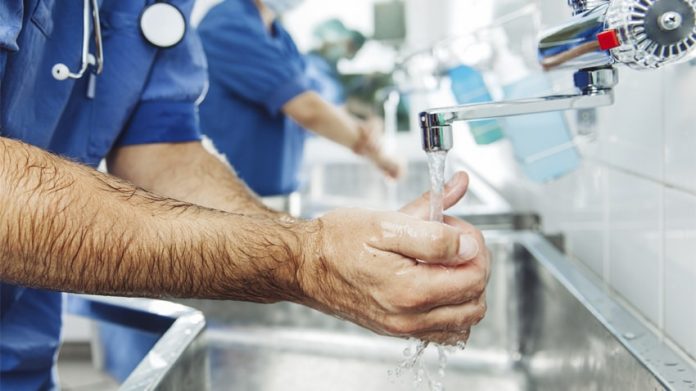Hand hygiene is one of the most important ways to prevent infections in the hospital. A new study indicates that health workers are more likely to clean their hands when other workers are nearby due to subtle peer pressure.
“Social network effects, or peer effects, have been associated with smoking, obesity, happiness and worker productivity. As we found, this influence extends to hand hygiene compliance, too,” said Philip Polgreen, MD, of the University of Iowa’s Carver College of Medicine and an author of the study, says in a news release. “Healthcare workers’ proximity to their peers had a positive effect on their hand hygiene adherence.”
For 10 days, 24 hours a day, researchers used a custom-built, badge-based system to assess hand hygiene in all healthcare workers in the medical intensive care unit. (The term “hand hygiene” refers to either handwashing or the use of alcohol-based hand sanitizers to kill germs on the hands.)
Physicians, nurses, and critical care staff randomly received badges at the start of each shift. The badges collected information about the workers’ proximity and hand hygiene compliance when they went in or out of patient rooms. Researchers recorded 47,694 opportunities for hand hygiene, both in patient rooms and out of their rooms.
Researchers found that the workers were seven percent more likely to follow hand hygiene protocols when other workers were closeby compared to when the workers were by themselves. When a worker was alone, the adherence to hand hygiene rate was 20.85 percent; when other workers were present, the adherence was 27.90 percent. The results were similar throughout the day.
The authors note that the results probably are related to “the importance of social environment in healthcare and have important implications for understanding how human behavior affects the spread of diseases within healthcare settings.”
According to the CDC, in the United States, hospital patients get an estimated 722,000 infections each year. That’s about 1 infection for every 25 patients. Hospital infections can be life-threatening and hard to treat; hand hygiene is one of the most important ways to prevent their spread.








